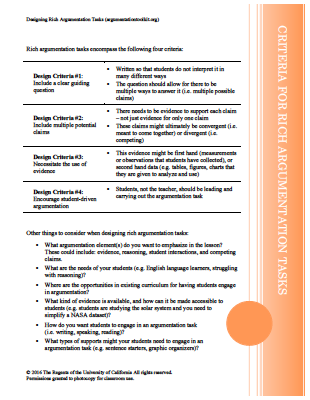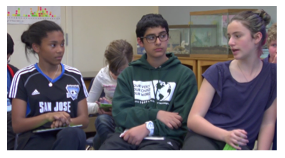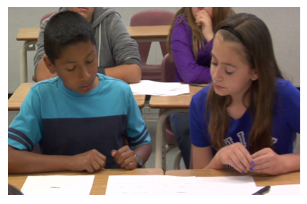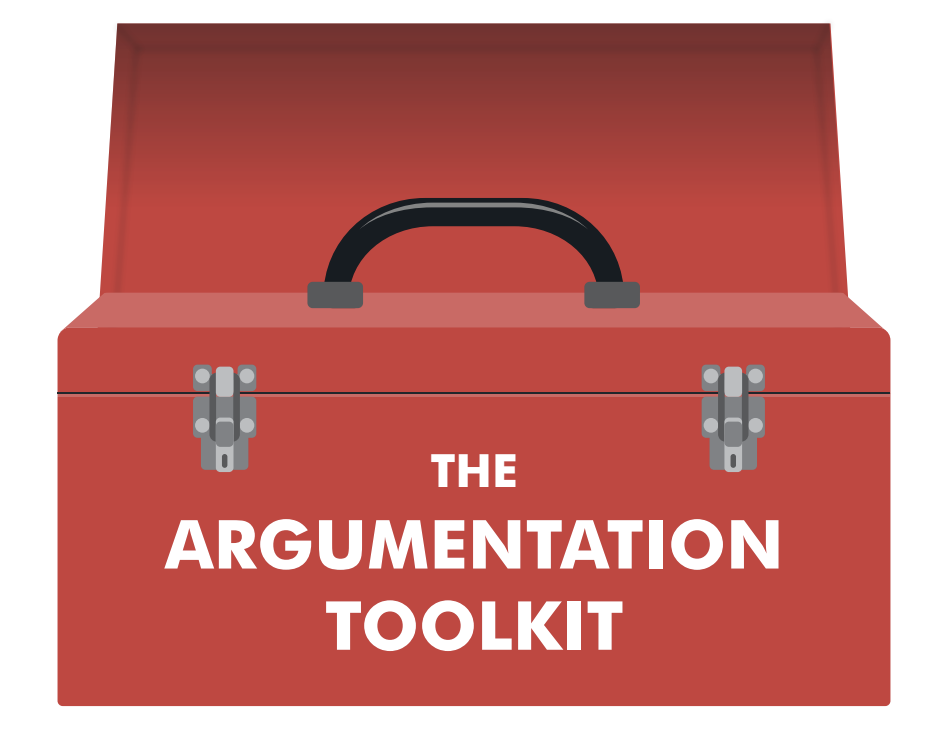Work session – designing a rich argumentation task
Advanced – Designing Rich Tasks Session 4
Session Goals:

- Teachers will be introduced to key criteria and other things to consider when designing rich argumentation tasks.
- Teachers will consider how various instructional activities (e.g. Evidence Gradient Tool, Anticipation Guide) align with the key criteria for rich argumentation tasks.
- Teachers will consider the ways that different instructional activities can support the four areas of argumentation in which students need extra support.
- Teachers will design a new lesson or revise an existing lesson to integrate a rich argumentation task into their science instruction.
- Teachers will identify areas of argumentation that are challenging for their students.*
*Note: This final goal is only applicable if the module is implemented as multiple sessions
Session Slides:
Advanced Designing Rich Tasks Session 4 PDF
Agenda:
*Extension Discussion – Preparation for work session
- Review of resources for design task
- Activity: Work time
- Activity: Share out
- Takeaways from the module
*Extension Discussion – Preparation for work session
Share your experience:
- Share how you marked the Argumentation Activities Planning Tool. Make sure to explain why you marked it as you did.
Discussion Questions:
- Was any activity challenging to mark in terms of the argumentation element you would highlight? Why do you think it was challenging?
- Are there any other activities you have used to support student engagement in argumentation? What are they, and which argumentation element(s) do they target?
1. Review of resources for design task
Read a reminder about the criteria for designing rich argumentation tasks.
Keep these criteria in mind as you revise a lesson to include an argumentation task. Feel free to use the following handouts as resources while you work to redesign a lesson:

2. Activity: Work time
The task:
- Design a new lesson or revise an existing lesson to integrate a rich argumentation task into your science instruction.
- You may choose to do this task individually, in pairs, or in small groups.

3. Activity: Share out
Share your lesson redesign, focusing on the argumentation task that you integrated into the lesson. Make sure to explain what you changed, as well as why you felt these changes were necessary.
Discussion Questions:
- Did anyone hear an argumentation task they liked and would like to keep in mind for their own instruction?
- What did you find challenging about designing or revising a lesson to include a rich argumentation task?
4. Takeaways from the module
- Rich argumentation tasks: 1) include a clear guiding question, 2) include multiple potential claims, 3) necessitate the use of evidence, and 4) encourage student-driven argumentation
- Existing curricula can be revised to better integrate rich argumentation tasks
- It is important to build a repertoire of instructional activities (e.g. evidence gradient tools, anticipation guide) for supporting students across different argumentation elements

View Other Sessions
Advanced Designing Rich Tasks Agenda
| Session Name | Description | Length |
|---|---|---|
| Session #1: What design criteria support rich argumentation tasks? | This session introduces four criteria and other considerations when designing rich argumentation tasks. | 45 minutes |
| Session #2: How can you support students to evaluate the quality of evidence? | This session incorporates an Evidence Gradient Tool as a means to support students in evaluating the quality of evidence. | 45 minutes |
| Session #3: How can you support students to revise their thinking given new evidence? | This session uses an Anticipation Guide to explore ways to support students in revising their thinking given new evidence. | 45 minutes |
| Session #4: Work session – designing a rich argumentation task | This session provides teachers with work time to develop or revise a lesson that includes a rich argumentation task. | 45 minutes |

